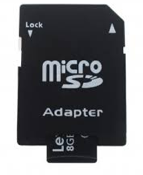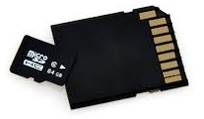

Solder (quickly!) to the gold tabs - pin 9 is offset at the clipped off corner (not used here)
Arduino speaking variometer
adding a micro SD card to store flight data
These are my backup project notes - please email me if interested
Objective
Solder to the tabs of a full-size-SD-to-micro-SD-adapter to hold a micro SD card in the variometer
Method
I followed this hack since it takes much less space than the various SD card shields for Arduino
http://arduinodiy.wordpress.com/2012/03/28/sd-card-on-arduino/


Solder (quickly!) to the gold tabs - pin 9 is offset at the clipped off corner (not used here)
My Arduino is set to run at 3.3 volts so I do not need the resistor voltage droppers to connect to the SD card
as in the link above.
I
connected as below.
(first number is the SD card pin - the second number is the Arduino digital pin - NC = not connected)
1 NC <---------this pin is furthest from the cut off corner of the SD adapter
2 12-MISO
3 NC
4 13-SCK
5 3.3 volts
6 Earth
7 11-MOSI
8 10-SS
9 clipped corner pin - NC
I used tinyFAT for the following first test with a Sandisk 2GB FAT16 micro SD card - it worked perfectly - I will test others later - more to come!
// Demo_writeLn (C)2011 Henning Karlsen #include <tinyFAT.h> byte res; void setup() { Serial.println("This demo will create a textfile, and fill it with 1MB of text."); long altitude = 1234; // <----------------------------------------------calculate these eventually char buffer[50]; sprintf(buffer, "the current altitude is %d", altitude); sprintf(timerbuffer, "the current time is %d", timer); file.writeLn(buffer); Serial.println("altitude and time saved"); file.closeFile(); void loop() |
more
to come!
Comments? email me